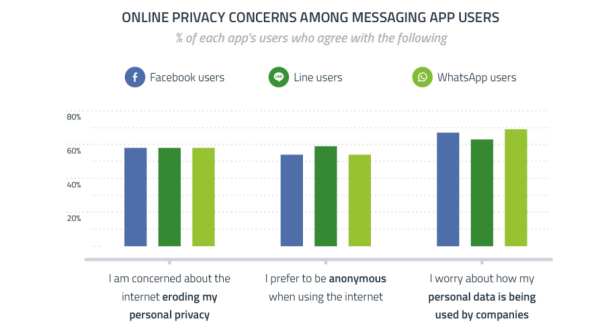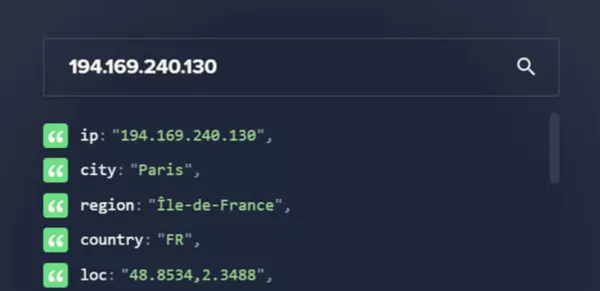
1. WhatsApp’s Encryption & Metadata Vulnerabilities
-
End-to-End Encryption (E2EE): WhatsApp claims messages are fully encrypted, meaning only sender and receiver can read them. However, as the Iranian article points out, metadata (who messaged whom, when, how often, etc.) is not encrypted and can be harvested.
-
The Guardian (2017): WhatsApp backdoor allows snooping on encrypted messages

Image 1: The design of Whatsapp trades off some security for usability, although experts say targeted, systematic surveillance would be very difficult. Photograph: Ritchie B Tongo/EPA -
Citizen Lab (2020): Report on how metadata exposes user networks even with E2EE. Network Security Issues

Image 2: Users concerns using FB, Line and WhatsApp -
Edward Snowden’s Warnings: “Metadata is the most dangerous form of surveillance”
-
Backdoor Allegations: Researchers (like those from The Guardian in 2017) have accused WhatsApp of having vulnerabilities that could allow forced key changes, enabling third-party interception. While Meta denies this, intelligence agencies (including Israel’s Unit 8200) likely exploit such weaknesses.

Image 3: 8200 Unit is described “the nation’s equivalent of Harvard, Princeton and Yale -
Israeli/Jewish Leadership Ties: WhatsApp’s co-founder, Jan Koum, is of Ukrainian-Jewish descent, and key engineers have ties to Israeli tech/military (e.g., Unit 8200 veterans). This fuels suspicions of bias in conflicts involving Israel.

Image 4: Whatsapp founder Jan Koum has quietly donated tens of millions of dollars to Jewish organizations now involved in relief efforts in Eastern Europe. 2. Evidence of WhatsApp Spying in Israel-Iran War
-
Location Tracking: Even without message content, IP addresses and metadata can reveal a user’s approximate location. If Israel (or allied agencies) accesses this, they could geolocate Iranian operatives. How It Works?

Image 5: Locate the IP Address: In the command prompt, enter “netstat -an” and hit Enter. This command will display all the IP addresses connected to your computer. With other applications closed, the list will be much shorter, making it easier to identify your contact’s IP address -
Past Cases: In 2019, Pegasus spyware (developed by Israeli firm NSO Group) was found targeting Iranian officials via WhatsApp vulnerabilities. Meta sued NSO, but the incident proved such exploits exist. Pegasus Spyware Targets
-
Iran’s Countermeasures: Iran has repeatedly blocked or restricted WhatsApp, claiming it’s a “Zionist espionage tool.” Some Iranian officials use local apps like Rubika or Signal (which is considered more secure). Iran urged it’s people to remove WhatsApp from their phone due to espionage
3. Geopolitical Bias:
– pro-Palestine posts suppressed (Human Right Watch)
– Pro-Israel narratives boosted (global disinformation industry)
4. WhatsApp in the Shadow War: Encryption Myth or Israeli Spy Tool?
Key Points:
-
Encryption vs. Reality: Does WhatsApp’s E2EE really protect users, or is metadata the weak link?
-
What’s encrytpted:
According to WhatsApp’s own FAQ on encryption source, here’s what is covered by E2EE:
- Text messages
- Photos and videos
- Voice messages
- Calls
- Status updates
- Location sharing
- Documents
What’s Not Encrypted:
- Most users assume “end-to-end encrypted” means all activity on the app is secure. But that’s far from the case. The following data is not encrypted:1. Metadata
- Who you messaged
- When the message was sent
- How frequently you communicate
- Device information and IP address
- Your phone number
- The recipient’s phone number
-
Israeli Connections: How WhatsApp’s leadership ties to Israel raise suspicions in conflicts. Israel remains the only actor who is able to hack WhatsApp!

Image 6: It would take huge computing power and advanced knowledge, which even most government agencies don’t have -
Case Studies: Pegasus, Iran’s bans, and evidence of geolocation tracking. Track someone’s geolocation via WhatsApp
-
Alternatives: Why some activists now prefer Signal, Session, or Briar for true privacy. The best private messaging apps:
Conclusion: What Can You Do?
WhatsApp’s encryption may shield your words, but its metadata loopholes and geopolitical ties make it a risky tool—especially in conflict zones. If even Iran’s government fears Zionist surveillance through Meta’s apps, should ordinary users trust it blindly?
Your Next Steps:
-
Switch to Secure Alternatives:
-
Signal (gold standard for encryption, no metadata collection).

-
Session (anonymous, no phone number needed).

-
Briar (peer-to-peer, works offline, resists censorship).

-
-
Demand Transparency:
-
Pressure Meta to release audits of WhatsApp’s backends (#ShowUsTheCode).
-
Support laws like the EU’s Digital Services Act forcing Big Tech to disclose spyware collaborations.
-
-
Spread Awareness:
-
Share this article with #WhatsAppSpying.
-
Discuss digital rights in your community—surveillance tools evolve, but so does resistance.
-
Final Thought:
“In the shadow war between nations, your phone is the battlefield. Choose your weapons wisely.” -
